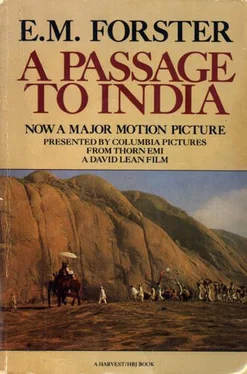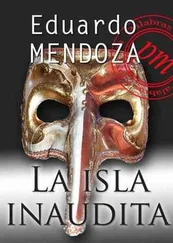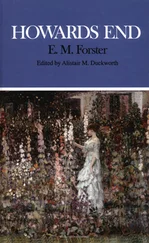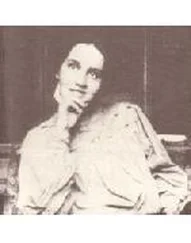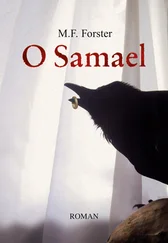"Like what?"
"Dr. Aziz, we have done you no harm."
"Aha, you know my name, I see. Yes, I am Aziz. No, of course your great friend Miss Quested did me no harm at the Marabar."
Drowning his last words, all the guns of the State went off. A rocket from the Jail garden gave the signal. The prisoner had been released, and was kissing the feet of the singers. Rose-leaves fall from the houses, sacred spices and coco-nut are brought forth… It was the half-way moment; the God had extended His temple, and paused exultantly. Mixed and confused in their passage, the rumours of salvation entered the Guest House. They were startled and moved on to the porch, drawn by the sudden illumination. The bronze gun up on the fort kept flashing, the town was a blur of light, in which the houses seemed dancing, and the palace waving little wings. The water below, the hills and sky above, were not involved as yet; there was still only a little light and song struggling among the shapeless lumps of the universe. The song became audible through much repetition; the choir was repeating and inverting the names of deities.
"Radhakrishna Radhakrishna,
Radhakrishna Radhakrishna,
Krishnaradha Radhakrishna,
Radhakrishna Radhakrishna,"
they sang, and woke the sleeping sentry in the Guest House; he leant upon his iron-tipped spear.
"I must go back now, good night," said Aziz, and held out his hand, completely forgetting that they were not friends, and focusing his heart on somethiiig more distant than the caves, something beautiful. His hand was taken, and then he remembered how detestable he had been, and said gently, "Don't you think me unkind any more?"
"No."
"How can you tell, you strange fellow?"
"Not difficult, the one thing I always know."
"Can you always tell whether a stranger is your friend?"
"Yes."
"Then you are an Oriental." He unclasped as he spoke, with a little shudder. Those words—he had said them to Mrs. Moore in the mosque in the beginning of the cycle, from which, after so much suffering, he had got free. Never be friends with the English! Mosque, caves, mosque, caves. And here he was starting again. He handed the magic ointment to him. "Take this, think of me when you use it. I shall never want it back. I must give you one little present, and it is all I have got; you are Mrs. Moore's son."
"I am that," he murmured to himself; and a part of Aziz' mind that had been hidden seemed to move and force its way to the top.
"But you are Heaslop's brother also, and alas, the two nations cannot be friends."
"I know. Not yet."
"Did your mother speak to you about me?"
"Yes." And with a swerve of voice and body that Aziz did not follow he added, "In her letters, in her letters. She loved you."
"Yes, your mother was my best friend in all the world." He was silent, puzzled by his own great gratitude. What did this eternal goodness of Mrs. Moore amount to? To nothing, if brought to the test of thought. She had not borne witness in his favour, nor visited him in the prison, yet she had stolen to the depths of his heart, and he always adored her. "This is our monsoon, the best weather," he said, while the lights of the procession waved as though embroidered on an agitated curtain. "How I wish she could have seen them, our rains. Now is the time when all things are happy, young and old. They are happy out there with their savage noise, though we cannot follow them; the tanks are all full so they dance, and this is India. I wish you were not with officials, then I would show you my country, but I cannot. Perhaps I will just take you out on the water now, for one short half-hour."
Was the cycle beginning again? His heart was too full to draw back. He must slip out in the darkness, and do this one act of homage to Mrs. Moore's son. He knew where the oars were—hidden to deter the visitors from going out—and he brought the second pair, in case they met the other boat; the Fieldings had pushed themselves out with long poles, and might get into difficulties, for the wind was rising.
Once on the water, he became easy. One kind action was with him always a channel for another, and soon the torrent of his hospitality gushed forth and he began doing the honours of Mau and persuading himself that he understood the wild procession, which increased in lights and sounds as the complications of its ritual developed. There was little need to row, for the freshening gale blew them in the direction they desired. Thorns scratched the keel, they ran into an islet and startled some cranes. The strange temporary life of the August flood-water bore them up and seemed as though it would last for ever. The boat was a rudderless dinghy. Huddled up in the stern, with the spare pair of oars in his arms, the guest asked no questions about details. There was presently a flash of lightning, followed by a second flash—little red scratches on the ponderous sky. "Was that the Rajah?" he asked.
"What—what do you mean?"
"Row back."
"But there's no Rajah—nothing——"
"Row back, you will see what I mean."
Aziz found it hard work against the advancing wind. But he fixed his eyes on the pin of light that marked the Guest House and backed a few strokes.
"There…"
Floating in the darkness was a king, who sat under a canopy, in shining royal robes…
"I can't tell you what that is, I'm sure," lie whispered. "His Highness is dead. I think we should go back at once."
They were close to the promontory of the tombs, and had looked straight into the chhatri of the Rajah's father through an opening in the trees. That was the explanation. He had heard of the image—made to imitate life at enormous expense—but he had never chanced to see it before, though he frequently rowed on the lake. There was only one spot from which it could be seen, and Ralph had directed him to it. Hastily he pulled away, feeling that his companion was not so much a visitor as a guide. He remarked, "Shall we gc back now?"
"There is still the procession."
"I'd rather not go nearer—they have such strange customs, and might hurt you."
"A little nearer."
Aziz obeyed. He knew with his heart that this was Mrs. Moore's son, and indeed until his heart was involved he knew nothing. "Radhakrishna Radhakrishna Radhakrishna Radhakrishna Krishnaradha," went the chant, then suddenly changed, and in the interstice he heard, almost certainly, the syllables of salvation that had sounded during his trial at Chandrapore.
"Mr. Moore, don't tell anyone that the Rajah is dead. It is a secret still, I am supposed not to say. We pretend he is alive until after the festival, to prevent unhappiness. Do you want to go still nearer?"
"Yes."
He tried to keep the boat out of the glare of the torches that began to star the other shore. Rockets kept going off, also the guns. Suddenly, closer than he had calculated, the palanquin of Krishna appeared from behind a ruined wall, and descended the carven glistening watersteps. On either side of it the singers tumbled, a woman prominent, a wild and beautiful young saint with flowers in her hair. She was praising God without attributes—thus did she apprehend Him. Others praised Him without attributes, seeing Him in this or that organ of the body or manifestation of the sky. Down they rushed to the foreshore and stood in the small waves, and a sacred meal was prepared, of which those who felt worthy partook. Old Godbole detected the boat, which was drifting in on the gale, and he waved his arms—whether in wrath or joy Aziz never discovered. Above stood the secular power of Mau—elephants, artillery, crowds—and high above them a wild tempest started, confined at first to the upper regions of the air. Gusts of wind mixed darkness and light, sheets of rain cut from the north, stopped, cut from the south, began rising from below, and across them struggled the singers, sounding every note but terror, and preparing to throw God away, God Himself, (not that God can be thrown) into the storm. Thus was He thrown year after year, and were others thrown—little images of Ganpati, baskets of ten-day corn, tiny tazias after Mohurram—scapegoats, husks, emblems of passage; a passage not easy, not now, not here, not to be apprehended except when it is unattainable: the God to be thrown was an emblem of that.
Читать дальше
